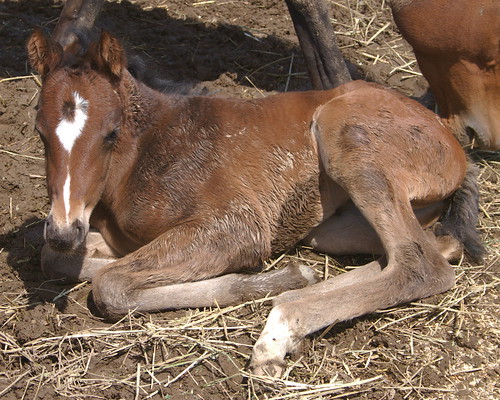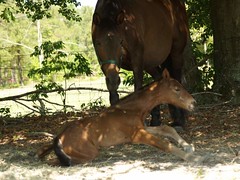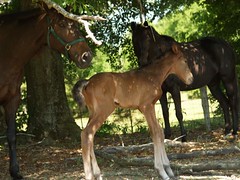Stable Management: Caring for the Mare and Foal

![]() photo credit: bozo_z_clown
photo credit: bozo_z_clown
Caring for foals is a very important part of raising horses, and it is something that you should know a lot about right form the get go. First of all, you have to make sure that you have tended to the mare before she foals. You want to be sure that you are feeding her a food that is going to help her maintain good health, and that you are giving her things that help her to gain the strength as well as the nutrients that she is going to need to be the kind of mother she should be. Check the grain and see that it is designed for a pregnant or lactating mare. Talk with a feed nutritionist to design a proper program for your mare.
Talk to your vet if you have never taken care of a mare and foal before. If you are unsure of how or what to expect get an experienced horseman to assist you. Also consult with your vet for advice if you have never had a foal before.
Know what is Normal
Ask the Vet what is considered normal for foaling. When the time comes for the foal to be born, you want to help as much as you can, but mostly you want to stay out of the way. There are some circumstances where you are going to have to help. Some horsemen often camp out in the stable to be handy incase of emergencies.
Foaling Check List and Supplies
Knowing what is normal is important. If the mare is in considerable discomfort a call to the vet may be necessary.
![]() photo credit: Hunter-Desportes
photo credit: Hunter-Desportes
Have a handy checklist nearby to outline the steps in foaling.
- Vet number and number of an experience horseman
- The mares udder fills and waxes up
- The muscles on the side of the tail loosens
- The mare may become restless and show signs of colic, kicking at belly
Keep these items on hand
- Clean dry towels
- Tincture of iodine and small container for dipping the foals navel
- Gauze bandage/ tail bandage
- Flashlight and replacement batteries
- Small blanket or down vest for the foal if it is cold
After the Foal is Born
Sometimes it is necessary to clean the foal’s nostrils. If the nostrils are not clear the foal will not be able to breath. If necessary, remove the mucus with a clean towel. Most mares usually clear the foal’s nostrils on their own.

![]() photo credit: Hunter-Desportes
photo credit: Hunter-Desportes
The foal should get up within an hour or try to get up within an hour. One of the first things a foal will do will investigate the mare’s udder and try to nurse. If the foal has not passed meconium (first manure) within the first 5 hours the vet should be called.
The mare should stand soon after foaling out. This is important for the mare’s health for her to stand soon after birthing. It aids in the passing of the placenta. Avoid pulling the placenta out as it can rip and a portion can remain in the mare. To ensure the entire placenta has been passed check it for tears.
Animals have been doing this for a long time and it will often go best if you leave them alone. If you have to help, try to be as discrete as possible, and be sure to do only the things that you absolutely know how to do.
 Try these three powerful exercises to get strengthen your position.
Try these three powerful exercises to get strengthen your position.

First time foaler 4yr old mare down to foal for two days, not fully in labour, is waxed up is this normal?? Gettin small pains occasionlly!!!